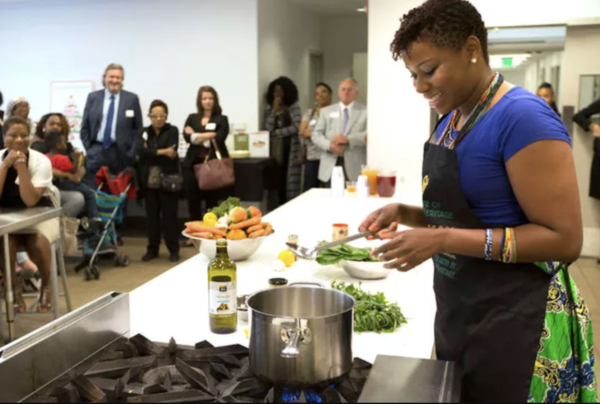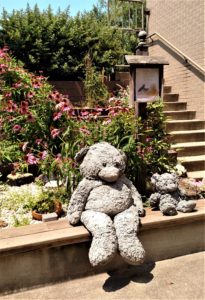MAY 2022 NEWSLETTER
 The May 2022 newsletter of Let’s Move in Libraries includes information about:
The May 2022 newsletter of Let’s Move in Libraries includes information about:
- An online event on food and librarianship
- A network on citizen science and librarianship
- How the American Library Association inspires outdoor librarianship
- A recap of our nature and librarianship online conversation
- A final request to fill out the Food & Public Libraries Census
- An invitation to join the National Children & Youth Garden Symposium
This month’s featured image is of Dejenaba Gordon demonstrating her twist on collard greens at the Free Library of Philadelphia in 2015 as part of “A Taste of African Heritage,” a six-week course developed by the Boston nonprofit Oldways to teach healthy cooking aligned with a plant-based African Heritage Diet Pyramid. Oldways has engaged volunteers around the country to run hundreds of such classes since 2012, with striking results.
Learn more about this topic from Sarah Anderson, Heritage Diets Curriculum Coordinator for Oldways, on May 12. Sarah is the keynote speaker of Gather at the Virtual Table: Community Conversations on Food and Librarianship, a free, online, half-day event.
All are welcome to join this interactive event on how food and librarianship can (and do!) come together! This event builds upon a series of informal, online conversations among a group of librarians and library partners interested in and working on this topic.
After Sarah’s keynote address, participants will move into break-out rooms to discuss contemporary needs and opportunities associated with supporting food literacy and food access in public libraries.
Facilitated by Janet Ingraham Dwyer, Library Consultant, State Library of Ohio
Description: Let’s share our stories and discover how many ways libraries help to literally feed our communities. How do libraries address hunger and food insecurity and promote community well-being? And why? We’ll explore direct food distribution, partnerships, referrals, publicity, awareness, and more.
Some questions to consider:
What do you know about hunger and food insecurity in your community, town, or campus?
What resources exist to combat hunger in your community, town, or campus?
What (if anything) does your library already do to address food insecurity?
What would you like to do to address food insecurity? What do you need to make it happen?
Facilitated by Philip Lee, Readers to Eaters
What food cultures exist in your community, town, or campus?
Facilitated by Stephanie Chace, Nutrition Literacy Coordinator, Boston Public Library
Description: Seed libraries, cooking classes, kids gardening clubs? Given all the different options available, where does a library start? Stephanie Chace, who recently became Boston Public Library’s first Nutrition Literacy Coordinator, is still figuring it out, and looks forward to conversation about your efforts to get started with food programming.
Some questions to consider:
What does food programming look like at your library?
What would you like to do to support programming related to food? What do you need to make it happen?
Facilitated by Julie Elmore, Library Director, Oakland City – Columbia Township Public Library, Indiana (Population served: 3,830)
Breakout room Topic #5: Dream big!: Planning for Culinary Literacy at the Library
Facilitated by Caity Rietzen, Director of the Culinary Literacy Center, Free Library of Philadelphia
Description: How and why did this library start a culinary literacy center? How can you, even on a small scale with resources available in your community? This breakout room focuses on planning for culinary literacy at the library.
Some questions to consider:
What do you know about the state of culinary literacy in your community, town, or campus?
What resources exist to support culinary literacy in your community, town, or campus?
What (if anything) does your library already do to support culinary literacy?
What would you like to do to support culinary literacy? What do you need to make it happen?
Sign up here! All are welcome to join this event. Please share the announcement widely.
A network on citizen science and librarianship
SciStarter invites you to join the National Citizen and Community Science Library Network. You don’t have to be in the United States to join – all are welcome!
They have a great array of free continuing education webinars on this topic, and we particularly like the ones on My Garden of A Thousand Bees.
Here’s what that webinar is about: “HHMI Tangled Bank Studios and the National Citizen and Community Science Library Network come together to help you learn more about the #PlantWildflowers campaign and how to engage your community to protect pollinators with a screening of the new PBS film My Garden of a Thousand Bees. You can also learn how to connect the #PlantWildFlowers campaign to citizen science projects like The Great Sunflower project, and get a glimpse of how to build citizen science library kits designed to make participating in citizen science accessible for library users! This webinar features speakers Jared Lipworth and Alex Pearson from Tangled Bank Studios, Katy Fenn and Clay Bolt from the World Wildlife Fund and Tara Cox from the National Citizen and Community Science Library Network at SciStarter.”
American Library Association inspires outdoor librarianship
 Our thanks to Cynthia Hirtzel, PhD, Patron and Volunteer with the Hubbard Public Library and the Hubbard Friends of the Library in Ohio, for sharing this inspiring story with us! Share your story to inspire others!
Our thanks to Cynthia Hirtzel, PhD, Patron and Volunteer with the Hubbard Public Library and the Hubbard Friends of the Library in Ohio, for sharing this inspiring story with us! Share your story to inspire others!
“Hubbard Public Library (HPL) has been selected as one of 200 libraries nationwide for the American Library Association’s American Rescue Plan: Humanities Grants for Libraries opportunity, an emergency relief program to assist libraries that have been adversely affected by the pandemic.
Mary Anne Russo, Children’s Librarian at HPL, commented that “This grant enables us to expand our programs and services Beyond Library Walls. For example, a permanent Story Walk® will invite families to participate in an outdoor reading experience on library grounds.”
“We are thrilled to be chosen for this amazing opportunity,” said Hubbard Public Library Director Lorena Hegedus. This grant provides HPL the ability to continue serving our community in ways that reach far beyond traditional programming and typical spaces. The pandemic has proven more than ever how needful libraries are. With this grant HPL will broaden programming to outdoor environments that will creatively engage individuals and families by providing healthy mind and body activities and interactive features that bring people together in safe, fun, and meaningful ways.”
The Beyond Library Walls / Library Beyond Walls “Bringing HPL Outdoors” includes the following in-progress and coming soon elements
- Sensory Garden Awning
- Permanent StoryWalk®
- Sensory Path/Walk
- Sunflower Petal Drums
- Outdoor Drum Instruments
- Pebble Harp
- Outdoor Musical Play Element
With funding from the National Endowment for the Humanities (NEH) through the American Rescue Plan Act of 2021, this public library will use funds to anchor itself in the community as a strong humanities institution. The competitive award comes with a $10,000 grant that will help the library deliver excellent programs and services related to culture, history, literature, and other humanities subjects.
Learn more at the library’s website!
A recap of our nature and librarianship online conversation
On April 13 we held our most recent Nature Programming Conversation.
This event was co-lead by Jana Hill. Adult Services Manager, Fort Worth (TX) Public Library, and Deborah Dutcher, Youth and Adult Services Consultant at the New Hampshire State Library.
More than 70 people joined our first two community conversation on this topic. The first, in January, led by Kelly Senser, Programming coordinator for Loudoun County Public Library, Virginia, and the second, in March, led by Kasi Allen, Youth Services Librarian, Twin Falls (Idaho) Public Library.
We hope to have more conversations on this topic later this year! If you’re interested in leading one contact us or fill out our Let’s Move in Libraries Experts Form.
A final request to fill out the Food & Public Libraries Census
As of Monday, May x # librarians from # states, as well as # librarians from other countries, including a,bz, have completed the Public Library Food Service Census.
Modeled on the U.S. Department of Agriculture’s Farm to School Census, Dr. Nicole Peritore of the Public Health Education program at Augusta (GA) University, and former Senior Specialist for Family Health at the University of Kentucky Extension, collaborated with Noah Lenstra to create this Public Library Food Service Census.
We are asking public library workers across North America to share with us:
- How your library currently supports food literacy and food access
- How your library has supported food literacy and food access in the past
- What resources you may need to better support food literacy and food access at your library
Results of this Census will be shared in future Let’s Move in Libraries newsletters, and online.
We hope to use this data to drive forward the conversation on food and librarianship, and to create stronger partnerships with allied sectors in schools, agriculture, and health.
The survey is now available online, and will close at the end of this week, May 6.
Please take some time to share add your library to this Public Library Food Service Census.
An invitation to join the National Children & Youth Garden Symposium
Sharing this invitation below from the American Horticultural Society:
Do you work with young people in a garden- or nature-based space such as a community garden, nature center, or green schoolyard? Join us for a professional development event where we are cultivating tomorrow’s gardeners by energizing, inspiring, and training today’s garden educators.
Registration is open for the American Horticultural Society’s 30th National Children & Youth Garden Symposium. This year’s symposium will take place in Richmond, Virginia from July 13-15, and will feature 45 educational sessions and inspiring keynote presentations by Rosanna Ayers of the Biomimicry Institute and Carolyn Schuyler of Wildrock Nature Play & Discovery Center. We’ll also check out Richmond’s lush gardens at our host site, Lewis Ginter Botanical Garden, and nearby Maymont and tour unique school and healing gardens and community-driven urban greenspaces.
Maximize your stay in the Richmond area with pre- and post-Symposium experiences including a trip to the Norfolk Botanical Gardens featuring the World of Wonders Children’s Garden, a welcome reception at the Kent-Valentine House, headquarters of the Virginia Garden Club, and a workshop at the intersection of nature, art, and immigration in America. Space is limited on these tours, so register soon.
Lock in early bird pricing – use this link to register online at a discounted rate! (AHS members will be prompted to log in to receive further discounted member pricing. If you are presenting at the symposium, your registration link will be sent in a separate email.) Prices increase after Friday, May 13.
Was this newsletter forwarded to you?
Subscribe to the Let’s Move in Libraries newsletter for monthly editions of success stories, educational opportunities, and food for thought that will deepen the impact of healthy living programs and partnerships involving public libraries. Also follow the project on Facebook, Instagram, and Twitter to stay up-to-date. The Let’s Move in Libraries is an international initiative focused on supporting Healthy Eating and Active Living (HEAL) through public library programs and partnerships.
